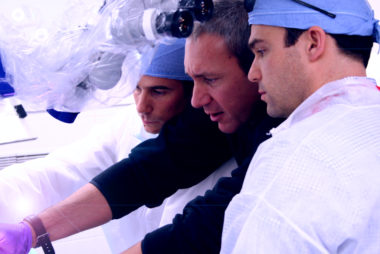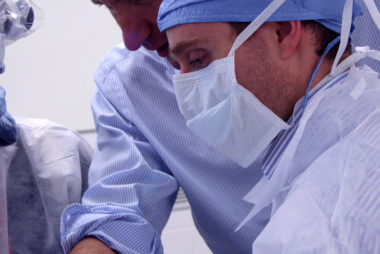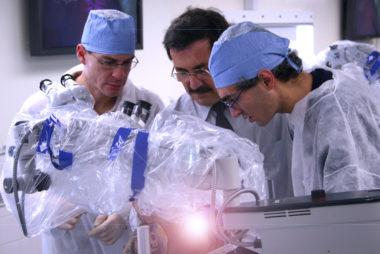Fellowship in Skull Base and Microneurosurgery

Lesions of the skull base present a unique challenge to neurosurgeons. Special training is required to perform intricate surgery in the small recesses of the brain. Most skull base neurosurgical approaches require dexterity with surgical instrumentation, specifically drills, through restricted corridors that contain vital structures. This aspect of surgery demands that surgeons be proficient not only with their tools but also with the complex anatomy to be traversed. The development of a working understanding of the anatomic relationships between neural and vascular structures encased by bone is critical and requires practice. In our skull base laboratory, complex approaches to the cranial base are performed on cadavers under conditions that simulate an actual operation as closely as possible.
We offer a lab-based Fellowship that provides training in the care of patients with pathologies of the skull base region through independent cadaveric dissection to rehearse complex approaches to the skull base.
Our Fellowship program involves an initial period of structured anatomosurgical education and dissection, involving regular anatomical presentations by the fellow, followed by a period of cadaveric research; wherein Dr. Bernardo works closely with Fellows to promote their surgical development. At the conclusion of the Fellowship, fellows should have an exhaustive understanding of the approaches to the cranial base, fellows should be able to define cadaveric prosection models to investigate new surgical routes to intracranial targets, navigate through various regions of the skull base, achieve adequate preoperative training for complex operative approaches, and complete at least 1–2 manuscripts suitable for publication depending on the duration of training. The fellowship varies in length from 4 to 12 months and is available to senior residents in neurosurgery or neurosurgeons who have completed training and are pursuing sub-specialized training. Fellows are also involved in teaching medical students and assisting with ongoing courses on skull base and vascular neurosurgery.


Applicants are admitted based on their background and experience. Admissions are conducted on a rolling basis and applications are accepted throughout the year, however applications should be submitted at least 12 months in advance of your requested start date. There is no cost to complete the fellowship training program, however fellows are required to purchase their own cadaveric specimen at a cost of $1,500 and an instrument deposit may be required. No financial compensation or salary is provided. The lab is in operation 24 hours/7 days a week. During periods of peak operation, Fellows may be placed onto either day or night schedules.
For more information please visit our Frequently Asked Questions page.
Please contact us using the button below to receive a link to our online application.
